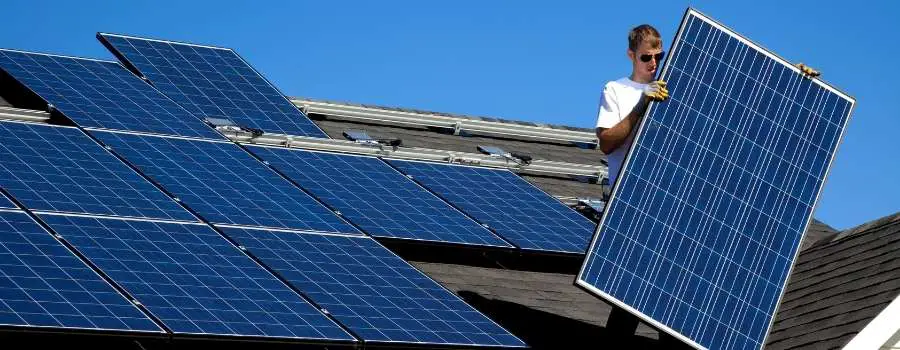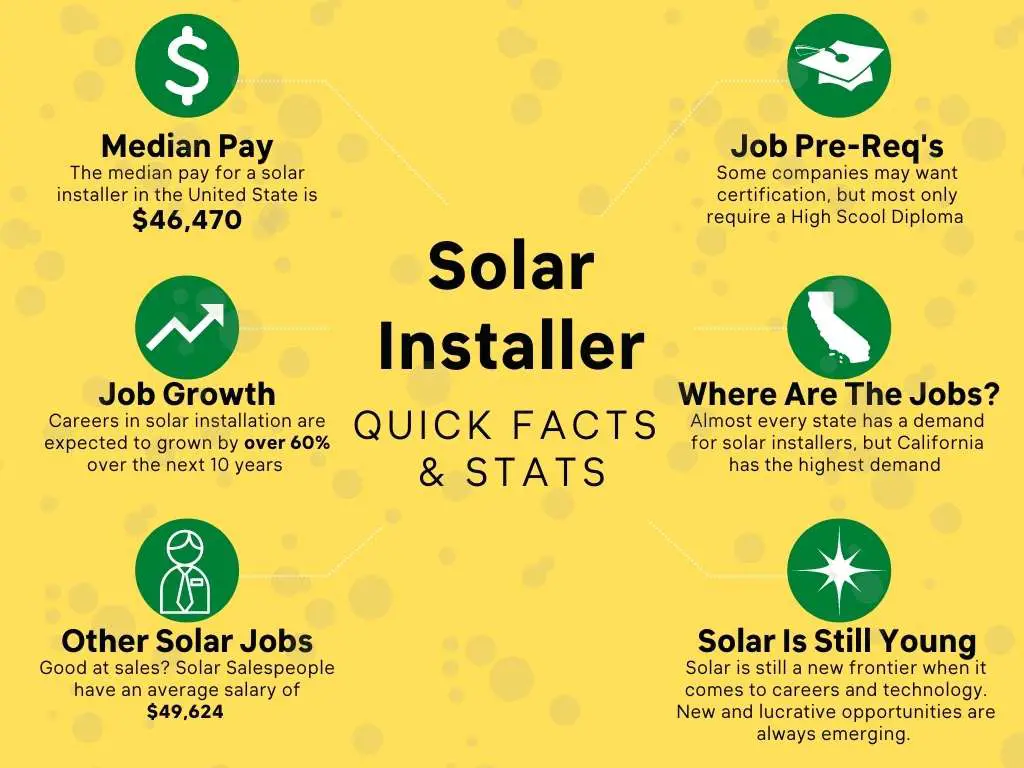
It seems like jobs in the trades are making a huge comeback for people that want a steady job with good pay and good benefits without the huge financial investment of a four-year college degree.
Most people know that there are steps and levels for many trade careers, such as plumbers and electricians but since solar is still fairly new and has seen a huge increase in recent years, I thought I would put together some info for people interested in a career in solar installation.
While there currently isn’t a widely used trajectory of apprentice, journeyman, and masters like electricians and plumbers have there are some things you should know before you dive in too deeply.
Is Becoming A Solar Installer Difficult?
In general, becoming a solar panel installer is not that difficult. Most solar panel installers have a high school diploma and then receive certifications through a trade school or other training programs.
Solar installation sounds like something that you would need to go to years of Technical Training at school for, but you don’t need to have a college education to become one.
These programs can take anywhere from a few months to a few weeks, depending on which courses you choose and how much time you’re able to devote to going through them.
For example, if you are going through trade school full-time, it’ll probably take you a matter of weeks, or if you are working a job and educating yourself part-time, it may take a few months.
Is Being A Solar Installer A Difficult Job?
The most challenging part of being a solar panel installer is the physical labor involved. It’s important that you are in good physical condition so that you can assemble, set up, and maintain these rooftop solar panel systems as well as other systems like solar farms.
The good news is that a lot of the installation work can be done from a ladder or elevated platform, so you don’t have to do that much heavy lifting.
However, there are times when you will need to be on the roof and do some strenuous activity. For example, when you are installing the panels, you may need to do some lifting and carrying of heavy equipment.
How Much Physical Strain Does Solar Installation Take?
In general, being a solar panel installer can be a physically demanding job that gets tougher as you age. It involves shifting a variety of tools and goods as well as repeated movements, so you’ll need to be in good shape if you want to pursue this career path.
Solar panel installers frequently:
- Use their hands to hold and control objects or tools
- Stand for a long time
- Walk for long periods
- Climb ladders, scaffolding, and poles
- Kneel, stoop, Crouch, and crawl
- Bend and twist their body
- Repeat movements frequently
Solar panel installers must be able to:
- See the details of an object from less than a few feet away
- Use their fingers to grasp, move, and assemble small things
- Make quick yet precise adjustments to controls
- Hold their arms in one position or hold their hand steady while their arm moves
- Be able to see different colors, shades, and brightness
- Move two or more limbs simultaneously such as two arms, two legs, or a leg and an arm but remain in place
- Be able to lift, push, pull, and carry heavy objects
- Use stomach and lower back muscles for support for an extended period
Solar panel installers will do better if they can:
- Not get tired after a lot of physical activity
- Be able to bend, stretch, twist, and reach
- Determine the distance between objects
- Being able to keep and regain balance
- Using muscles for extended periods
- Having quick reactions using hands, fingers, and feet
- Hearing sounds and recognizing differences between them
- Seeing in very bright light
- Seeing objects or actions that are in peripheral vision

Is There A Demand For Solar Panel Installers?
Careers in the solar installation field are expected to grow 63% over the next decade as the solar industry increases. Many new businesses and governments start to move into green economic developments.
The green movement is fueling more companies and governments to offer incentives to companies that turn towards more sustainable energy sources. This means that there are many opportunities available for you to work in solar.
The biggest motivator for the expansion of solar energy and thus increasing the demand for people who are trained and interested in working with solar panels is that both federal and state governments are offering financial incentives to individual homeowners and companies, and businesses. Governments want to decrease the pressure on gas and electric grids as the population grows.
Another big reason solar panel installers are in such high demand is that companies and businesses are becoming more aware of their energy consumption costs. More companies and individual homeowners are looking up cheaply installing alternative power sources. There is a massive increase in demand for solar hot water systems, which forces retailers to become more aware of offering Solar Products.
There is such a high demand for solar panel installers because people, in general, are more aware of environmentalism. North America thinks more about solar power Alternatives than they would have 20 or even ten years ago. Solar energy is a renewable source that is very environmentally friendly, and more people are looking to introduce those alternatives to their homes and businesses.
What Are The Benefits Of Being A Solar Panel Installer?
In general, the most significant benefit of being a solar panel installer is an ever-increasing demand for people with good training. It’s also a career with some longevity since the technology is evolving and new innovations will open up new job opportunities.
As the industry grows, there will be more opportunities to make money. The median salary for a solar panel installer is about $42,680 as of right now, but it will only increase as you specialize further into the field and get experience.
| State | Average Salary (per year) |
| California | $40, 488 |
| Arizona | $45, 531 |
| Texas | $38,384 |
| New York | $40,331 |
| Florida | $42,785 |
The chart above shows some average salaries of solar installers based on state. This chart does not take into account bonuses and overtime…for instance, a solar installer in Arizona can also expect an additional $6500 per year in overtime.
This type of career also offers you more of a career, given that this industry will continue to grow and gain in popularity. This is only the beginning of the solar industry starting to get its footing as an energy source. More companies have begun to think of solar alternatives to traditional energy sources.
Keep in mind that the industry is still very young, which means that there are many opportunities for those willing to learn and quickly adjust to the emerging market. Once you have worked for several years as a solar panel installer, you may want to start looking into creating your own business within the solar market using that experience.
